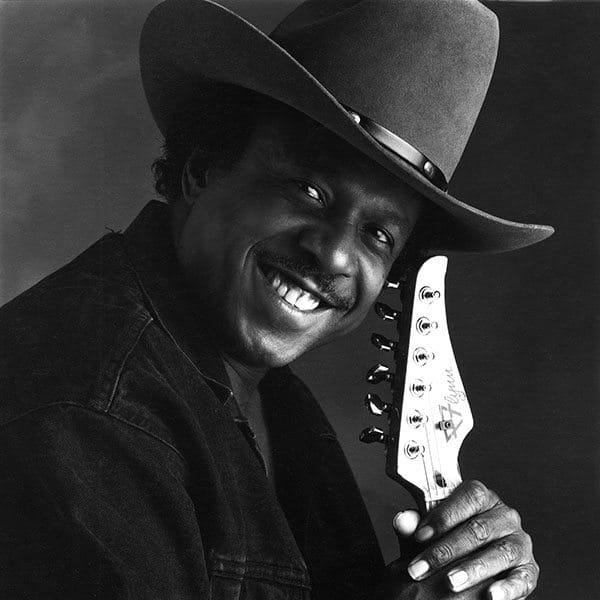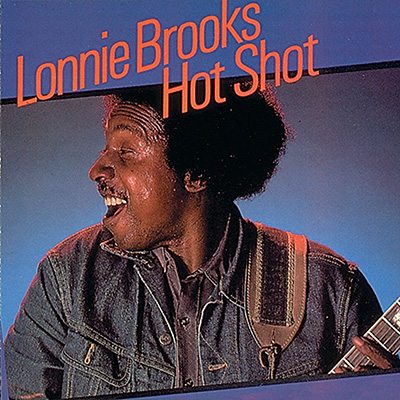
Photo by Sandro Miller/ Provided by Alligator Records.
Lonnie Brooks was a man with extraordinary talent that was overshadowed by his humility. That’s what made him so likeable.
The legendary bluesman died April 1, 2017, at age 83. Brooks said in a 2009 interview that being humble is what motivated him to work hard at his craft.
“I thought everybody was better than me,” he said. “I always was fighting to be as good as the one I thought was the best. It helped me a lot. Because if you’re satisfied you stop, and I never did stop. I always tried to do more than what I’d been doing. Every time I hit the stage, I try harder. Sometime it don’t work, but sometime it does.”
Brooks moved to Chicago in 1959 during the greatest era of the blues. A guitarist could step in to any of a hundred West Side clubs and be humbled by seeing and hearing the likes of Otis Rush, Magic Sam, B.B. King, T-Bone Walker or Elmore James.
A Louisiana native, Brooks played professionally for the first time in a zydeco band with Clifton Chenier. But he wanted to play blues. Brooks was on tour in Atlanta when he befriended the great soul singer Sam Cooke, who invited him to come visit Chicago.
“I was kind of shy,” Brooks said. “I didn’t know how to meet anybody. I’d heard so much about Chicago, I was scared of everybody. One guy I loved to hear him play but who wouldn’t even pass his time with me was Otis Rush. He was off to himself. The cat was always thinking about something, I guess. He didn’t talk too much. He’d go in his dressing room and lock himself in and stay there until it was time to go back. But I met with Magic Sam. I started following him around. He would talk to me. He was friendly, like a country boy. I saw him one night. I’d watch him, and I’d go home.”
“I really bought my guitar to play blues. But when I bought it, the blues was so hard for me. I loved it, but I didn’t feel it playing it. So I went with what I could play because I wanted to play the guitar. And I started doing the rock and roll and a lot of people were saying it was country rock. Something kept telling me, go somewhere where you can go play the blues. I used to listen to the records but I think you learn it much faster if you go see somebody play it.
“Watching their fingers on the guitar and you get an idea of what they’re doing, if you already know how to play a little bit. When I was a kid I used to listen to Lightnin’ Hopkins and Muddy Waters and John Lee Hooker, and a bunch others I used to listen to on the radio. And I had a first cousin who could really play that stuff really good. But back then, I could mess around with a banjo a little bit, because my grandfather had a banjo. I could play that a little bit, but I loved his guitar because just the sound of it was unique to me.”
After moving to Chicago, Brooks had an epiphany on a night he watched Magic Sam.
“He and his girlfriend got in an argument and he got mad and just turned a bottle whiskey up and drank a half a pint right on down. Then he got on the guitar and just started playing, and I felt him then. I was watching him how he was holding his strings and what he was doing to. And I went home and remembered everything. I went down in the basement. And when I come up, I could play. I just felt him all the way. Because I knew he meant it. Just to see what he was doing. He was squeezing the strings so hard and grinding them because he was angry. I found it.”
Before he learned to play blues with a feeling, Brooks already had a blues name. His real name was Lee Baker, but he went by the moniker Guitar Junior. However, there already was a bluesman in Chicago called Guitar Junior, a sideman for the great Muddy Waters.
Brooks’ son Ronnie Baker Brooks explained in a Chicago Sun Times obituary:
“He chose Lonnie Brooks because his best friend from growing up in Louisiana, his last name was Brooks. And he changed his first name to Lonnie because people down there they used to call him ‘Little Lee,’ but it came out sounding like ‘Lonnie’ with the Cajun accent.”
—
Lonnie Brooks’ sons Ronnie and Wayne also are blues guitarists and, like their father, are talented, amiable and humble. I interviewed Ronnie for the first time in 2007.
“When I first started playing, I was intimidated by my father. Even today, I look at him like some people look at Elvis Presley or The Beatles. I never thought I could do what he was doing. My father was always going, ‘Yes you can, you can do it.’ I couldn’t even play in front of him. I used to have to turn my back. He said ‘If you can’t play in front of me how are you going to play in front of some people?’ ”
Ronnie Baker Brooks has a deep appreciation for being his father’s son.
 “I used to go over to (Buddy Guy’s) house,” he said. “I was raised with his kids because his first wife and my mom were best friends. I would see him playing and I didn’t realize that was Buddy Guy. Or hanging out with Junior (Wells) and Son Seals and Koko Taylor who used to come over to the house. I didn’t realize who they were. They were just other musicians to me. When I got older I realized this is not normal. That’s when I was like, ‘OK, now I have an obligation here to continue that legacy for my generation and the generation after me.’ ”
“I used to go over to (Buddy Guy’s) house,” he said. “I was raised with his kids because his first wife and my mom were best friends. I would see him playing and I didn’t realize that was Buddy Guy. Or hanging out with Junior (Wells) and Son Seals and Koko Taylor who used to come over to the house. I didn’t realize who they were. They were just other musicians to me. When I got older I realized this is not normal. That’s when I was like, ‘OK, now I have an obligation here to continue that legacy for my generation and the generation after me.’ ”
—
I became a fan of blues music after I took my first newspaper job. I used to listen to a Saturday night show on a San Luis Obispo radio station, and because I loved Brooks’ rendition of “Sweet Home Chicago,” I bought my first blues record: Alligator Records “Blues Deluxe (1980).”
I continued to buy Brooks’ vinyl records until the mid-90s when CDs became popular. He was my favorite. The soundtrack of my life that is in my head still plays songs during the appropriate occasions such as “One More Shot,” “Heavy Traffic” and “Sweet Home Chicago.” Brooks had a joyful shouting style of singing that blended so well with his upbeat guitar licks.
The last part of my 30-year newspaper career was as an entertainment writer. My predecessor (Denise Sloan) gave me some advice: “If you really like somebody, don’t meet them. They will let you down.”
Interviews on the telephone are far different than meeting someone in person. Quotes by Brooks used earlier in this story were from a phone call for a story advancing a concert at the Lake Tahoe Outdoor Arena at Tahoe. Along with an incredible lineup that included Jimmy Johnson, Mavis Staples, The Mannish Boys, Eddie “The Chief” Clearwater and Lonnie Brooks accompanied by his son Wayne, the show brought the worst weather in the history of the summer concert series.
As rain soaked the small audience, Mavis Staples played past curfew. Organizers were unhappy but I was thrilled. Not only by the great show, but by using the opportunity to sit down backstage and talk with my hero Lonnie Brooks.
I was happy to have not taken my newspaper mentor’s advice. Brooks was as friendly and nice as I’d imagined he would be. He spoke philosophically with a homespun parlance. He was humble.
He told me he started to teach his son the guitar when he was 6. “Now he can outplay me.”
We were sitting in a trailer. Eddie “The Chief” Clearwater picked up a plate of food wrapped in plastic and left me and Lonnie Brooks alone to talk about the blues.
“I was telling my son that it’s the best time to play the blues because we’ve still got blues lovers out here. Everybody’s running away from it because they say, ‘Oh man, there ain’t no more clubs.’ The best thing to do when it’s like that is to keep on working at it and you’ll wind up being the onliest one playing it and you’ll get all the work. That’s the way I look at it.”
-Tim Parsons
The family of Grammy-nominated Chicago blues icon Lonnie Brooks, who died on Saturday, April 1, has announced the visitation and funeral information for the late blues legend.
Visitation: Sunday, April 9:
Blake-Lamb Funeral Home
4727 W. 103rd St.
Oak Lawn, IL 60453
Wake/Viewing 3:00pm – -9:00pm
Funeral: Monday, April 10:
Liberty Temple Full Gospel Church
2233 W. 79th Street
Chicago, IL 60620
Visitation 10:am – 11:am
Services 11 am
Interment following the service:
Lincoln Cemetery
12300 S. Kedzie Ave.
Chicago, IL 60655
In lieu of flowers, donations may be made to:
The Lonnie Brooks Memorial Fund
PO Box 672
Dolton, IL 60419
On Sunday, April 2, Chicago Mayor Rahm Emanuel released the following statement:
“Lonnie Brooks was a Chicago blues legend with a towering talent and soulful style that won him legions of fans across the country and around the world. His celebrated career inspired generations of music lovers, garnered numerous awards and brought him from the clubs of Chicago’s west side to the concert halls of Europe and beyond. Amy and my thoughts and prayers are with Lonnie Brooks’ family, friends and fans who are mourning his loss and celebrating his remarkable life.”
